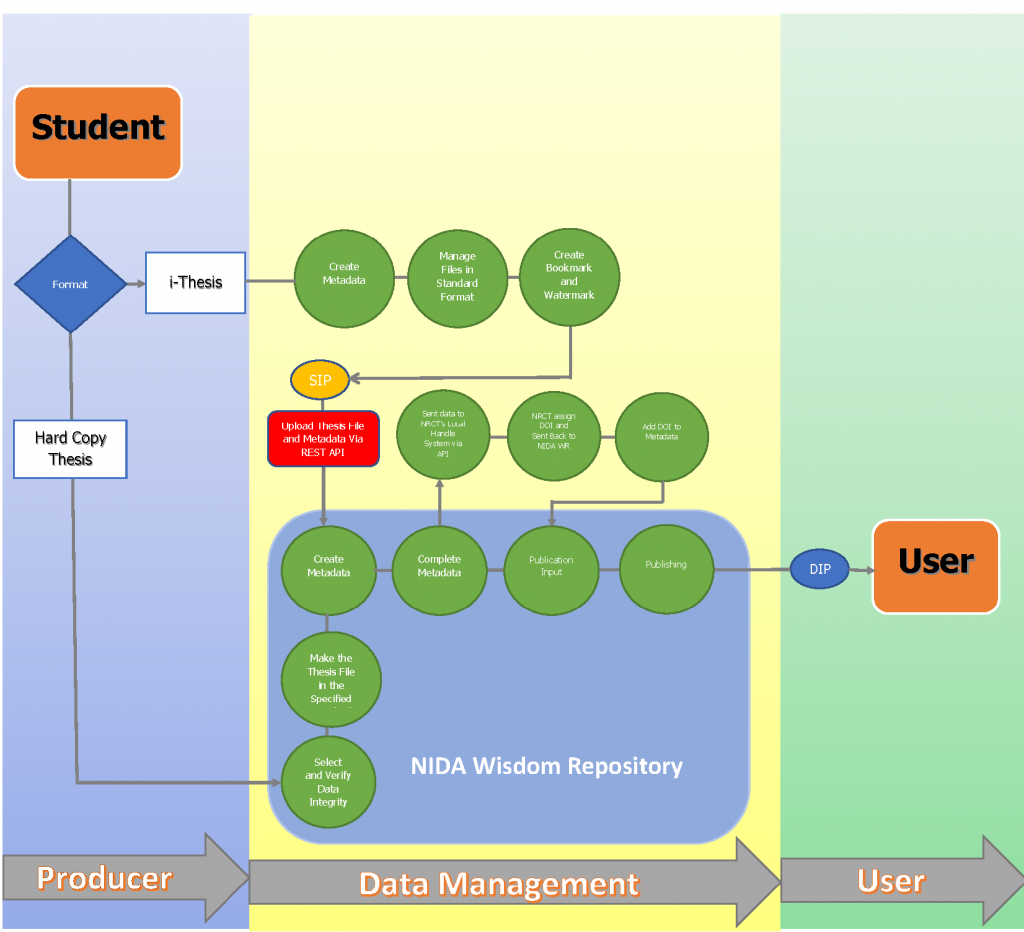NIDA Wisdom Repository: Workflow
Wisdom Repository, National Institute of Development Administration (NIDA Wisdom Repository), is the source of collections, storage, preservation and dissemination of knowledge and wisdom, which are the works of faculty, students, and personnel of National Institute of Development Administration. The works are in forms of documents, print media, and multimedia, all of which are preserved and converted to become digitalized in standard formats so as to provide service accessibility among the user, both inside and outside the Institute at all times.
The Library and Information Center has adopted the framework of Open Archival Information System or OAIS Reference Model as a reference standard for NIDA Wisdom Repository’s workflow implementation in accordance with practice guidelines in good manners, accepted standardized preservation, long-term information accessibility, and information retrievability at all times.

The workflow of Wisdom Repository is used as the operational procedures adhering to NIDA Wisdom Repository’s development policy and digital information resources plan.
The workflow of NIDA Wisdom Repository is divided into three parts.
- Producer
- Data Management
- User
1. Producer
A producer is the student at National Institute of Development Administration who conducts a thesis fulfilling the curriculum requirement of the Institute. Producer manages the thesis submission in 2 ways as follows:
1.1 Thesis received by i-Thesis
i-Thesis is the system that the Institute supplies and uses for thesis preparation ranged from proposal, draft version, complete version to disseminated version in Wisdom Repository. After the thesis preparation procedures have been completed, such thesis will be disseminated as normal, disclosed, or over the embargo period as the licensing rights granted by the thesis owner for thesis dissemination in forms of both hard copy and electronic file, as indicated in License Agreement on Thesis Preparation and Dissemination in Electronic Formats, National Institute of Development Administration, which is granted to the Library and Information Center. By means of i-Thesis, various entries of the thesis are extracted and generated as the metadata according to the standard of Dublin Core Metadata Initiative (DCMI). Also, the thesis file format will be converted from MS-Word to PDF to suit any use, and i-Thesis creates a bookmark and watermark logo of National Institute of Development Administration and indicates the rights to using the file. After that, Wisdom Repository’s personnel will check, improve, and edit the metadata to meet the standardized format and for service.
1.2 Thesis in an old format not originally received by i-Thesis
The student of National Institute of Development Administration prepares and submits the thesis in a form of hard copy with a digital file to the Library and Information Center for the preservation and grants the permission for online dissemination under License Agreement on Thesis Preparation and Dissemination in Electronic Formats, National Institute of Development Administration.
The personnel of Wisdom Repository will prior check the integrity of all works for accuracy and thorough completeness of the work. If the data is detected incomplete, missing, damaged, or unable to open, the personnel will notify the faculty or the center or division that Producer is affiliated to for the resubmission to Wisdom Repository.
In this regard, the digital file received from the center or unit that Producer is affiliated to is the original source file as the data to be imported into Wisdom Repository. If the digital file format does not conform to the requirements, the digital file format will be made accurate.
2. Data Management
When Wisdom Repository receives the document or the original source file from Producer (Part 1) for importing it to the Submission Information Package (SIP), the personnel of Wisdom Repository will then carry out the Data Management process by following “Manual of Managing Digital Files and Importing Data into NIDA Wisdom Repository”, of which the process consists of 8 steps.
2.1 Selections
Wisdom Repository’s personnel select the thesis that has been granted permission for dissemination and check that the thesis qualifications comply with the policies of the Wisdom Repository, and such work must not contradict to or violate ethical principles, National Security Act, Personal Data Act, B.E. 2562 and related Copyright Act. If any violation is detected later, the work will be dismissed from the Wisdom Repository service.
2.2 Importing data into Wisdom Repository
Importing the complete, accurate approved thesis data involves these two methods as follows:
- Mapping: i-Thesis imports the data into Wisdom Repository. In the i-Thesis system, the data are mapped to the international standard for cataloguing the digital information resources using Dublin Core Metadata Initiative (DCMI). Then, i-Thisis sends Wisdom Repository the metadata, with the approved disseminatable digital thesis file, as the granted licensing rights. However, if the data are inaccurate or incomplete, such data will be checked for its correction and completion to reach the standards as required by Wisdom Repository.
- Key New: The data are entered into Wisdom Repository by using the specified Template, and the full-text document file will be uploaded. However, if the data are found inaccurate or incomplete during the process, the Wisdom Repository system will check, correct, and complete the data according to the standards required by Wisdom Repository, and the data then will be keyed in.
2.3 Dublin Core Metadata Initiative (DCMI)
Wisdom Repository uses Dublin Core Metadata Initiative (DCMI) to meet the international standard for cataloging the digital information resources whereby Wisdom Repository’s personnel will create the metadata for all of thesis entries for describing the details of data in the digital file, by which the metadata must cover all these 3 data elements as follows:
- Data elements of information resources content such as title, subject heading, language, coverage, source, and relation
- Data elements of intellectual property such as author, co-creator, scholarly works, publisher, and rights
- Data elements of instantiation or version such as, publication, type, format, and identifiers or codes
Dublin Core Metadata Initiative (DCMI) is widely used and internationally accepted for cataloging data entries; it is found flexible and adequate for the service user, and it allows additional elements needed for specific descriptions of works. Therefore, it eases the service user to quickly search and access document files. Additionally, DCMI is developed on basis of XML standard, thus supporting data transmission between digital information repositories via API and/or the OAI-PMH protocol. This enables Wisdom Repository to automatically receive the metadata and digital document files via i-Thesis and to provide thesis data service in a quick manner. DCMI also enables other cooperated information repositories to harvest the metadata of Wisdom Repository for importing the data into their own database, automatically.
For Thai subject heading, Wisdom Repository uses Controlled Vocabulary, according to Online Thai Subject Headings by Information Resources Analysis Working Group of Academic Libraries and, for English subject heading, uses the Library of Congress Subject Heading (LCSH); keyword and natural Language are identified.
2.4 Digital File Management
- When the metadata is received, the digital file is also imported automatically via i-Thesis. The received file is stored in the Archival Storage of Dspace for preserving the digital file and enabling digital file accessibility in a long term. The file will be uploaded and stored in Archival Information Package (AIP) in Wisdom Repository. The thesis file received from i-Thesis is in the PDF file format with a bookmark and a watermark logo of National Institute of Development Administration, and the file is ready for service instantly.
- When the metadata of the thesis that was submitted in original formats, both hard copy and file format, are catalogued, such imported digital file must be arranged into a specified format that is the PDF format with the bookmark and the watermark Logo of National Institute of Development Administration. The digital file is, then, uploaded in the system according to each metadata list, accurately and completely.
2.5 Add License Policy
After arranging the metadata and uploading the file, Wisdom Repository’s personnel will check and input the detailed data relevant to the copyright of the work into the system according to Permission for Academic Work Dissemination on Websites.
2.6 Check, Edit Metadata and Test File
Wisdom Repository’s personnel checks the data, edits the metadata, and tests the file for the last time to ensure that the record of academic work contains the accurate, complete metadata and that the academic work record has adequate details for the service user to search, read, and consider for use of the work. The personnel also ensure that the file that is used for download is in accordance with the terms of rights to use.
2.7 Publish Data
After testing and checking in the final stage, Wisdom Repository’s personnel will confirm the data dissemination in the DSpace system so that the user can then search and download Dissemination Information Package (DIP) for use.
2.8 Create Digital Object Identifier (DOI)
In order for academic works available in Wisdom Repository to be accessible in a long term and to become the backup file sources that will help to effectively preserve the academic works of Wisdom Repository, the personnel of Wisdom Repository will send the academic work data to Digital Research Information Center, National Research Council of Thailand (NRCT), to request for a Digital Object Identifier (DOI). When the NRCT issues a DOI, the DOI will be sent to and imported into Wisdom Repository.
3. User
Wisdom Repository provides the user with service for searching and downloading academic works as the Free Open Access database. So, the service user, both inside and outside the Institute, can search for information via the website of Wisdom Repository in compliance with the terms and conditions of use via the website. Intending to download a thesis file, the user must accept the condition stating “All the information resources in Wisdom Repository are used only for teaching, learning and research. Any subsequent use shall require the source to be cited. Do not modify and duplicate the content. The user is not permitted to use the resources for commercial purposes in any case.”






